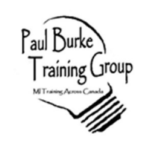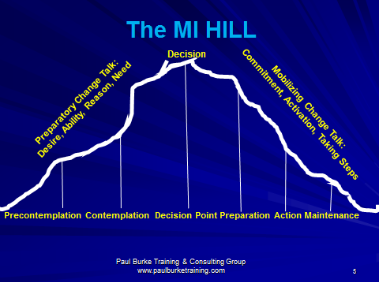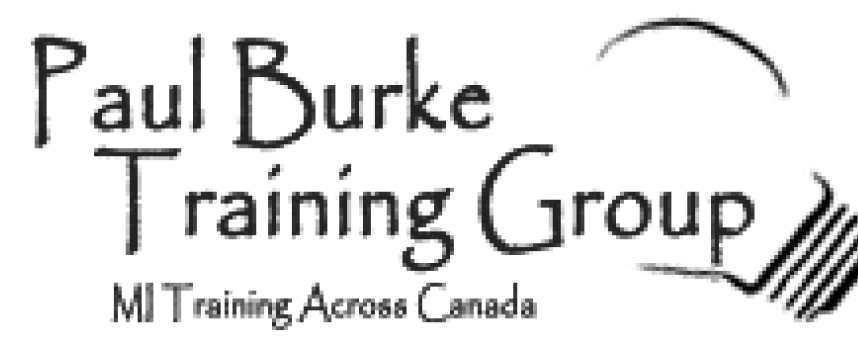
Paul Burke Training Group
Telephone: 1-250-385-6468. Toll-Free: 1-855-MI-TRAINERS
Web: www.paulburketraining.com
E-mail: info@paulburketraining.com
Beyond training: Looking at learning MI in a whole new light!
Thoughts on Improved Practice (TIP) #2312

Evoking work involves “pulling out” the desire and need for the targeted change from your clients, rather than trying to install such motivations. Evoking also involves calling forth client discussion about the reasons they have for pursuing change and about their skills, abilities, competencies, and positive traits that could be utilized in accomplishing the change.
A question that arises for many MI learners as they practice away at their engaging and focusing work is “when should I start the process of evoking?”
The answer, for the most part, is fairly straight-forward. Once you and your client have a focus for the conversation (and you know the “targeted” area of change that defines the general boundaries of your discussion, evoking work can begin. In some situations, this could take five minutes, and in others it may take more than one interview.

Often in the early part of MI work it’s common for clients to not yet have made a decision to pursue change. (It’s helpful to think of these clients as operating within the pre-action stages of change). Before clients make a (internalized) decision to plan for change, it’s helpful to practice with MI skills which serve to evoke (or to “call forth”) DARN language.
In MI-3 (2013) Miller and Rollnick describe the “MI Hill”. They state that “one thing to ask yourself during a consultation is where you are on the hill. For both clients and interviewer the process of evoking preparatory change talk can indeed feel like an uphill slog, an effortful and strategic step-by-step climb up the slippery slopes of ambivalence” (p. 163).
The “uphill” part of the motivational journey involves helping people think, talk, and walk themselves into the development of readiness for change, willingness to change, and to enhanced awareness of their ability to change.
The good news is of course that once a client is using good, solid, preparatory language (DARN) – it’s a bit easier to start going after those famous MI “CATS” (Commitment, Activation, and Taking Steps)! Once the necessary preparatory work has been accomplished while on the strategic uphill climb, clients begin to move away from talking about whether or not they ought to change (need) or why (reasons). Instead, they begin to speak about when they will begin to set things in motion, and how they might go about it. Such change in language signals that the client is ready for your help in the planning process.
This week, you’re invited to practice with increased and deliberate intent to work at polishing your “effortful and strategic, step-by-step” skills (as Miller and Rollnick describe them) with evoking change talk – after you and your client achieve the focus of your work together. Practice with using some strategically timed evocative questions:
- How would you like things to be different? (evokes Desire talk)
- What skills and resources have you used when you’ve made other significant changes in your life? (evokes Ability talk)
- What would be some of the “upside” for you if you were able to make a change such as the one we are discussing”? (evokes Reason talk)
- What’s the worst case scenario for you if this change did not happen? (evokes Need talk)
- So, what kinds of things are you thinking about in terms of getting the ball rolling with this change? (evokes Activation talk – but only if there has been sufficient DARN talk already drawn out and placed on the table!)
- So, in terms of a plan, what will you do as your first step here? (evokes Commitment talk – if the client’s DARN talk has been giving a darned good listening to!)

Evoking work is strategic. Getting good at it takes time – and some concentrated effort. It’s worth your client’s while for you to learn it! Evoking change talk is the primary way that we give a “hand up” to our clients in moving them from “I can’t” to “I can”, and from “I won’t” to “I will”!
Of course, there are many, many more questions than the few I’ve provided here that you’ll invent and experiment with as you practice evoking various kinds of change talk. Some additional examples are provided on the back of the laminated “tent cards” that you received at the first workshop. Keep those handy this week and use them as “cheat cards” if you like – until those questions become readily available in memory – for use exactly when needed!
Once you get quite comfortable in using some strategic questions to evoke DARN-CATS talk, you can also work on evoking through strategic reflections and affirmations. (Remember that what clients hear themselves saying through the mirror of your reflections is often what they expand upon as the conversation continues.) I’ll be writing more in the weeks ahead about practicing evoking with well-constructed reflections. For this week though, my wish for you is that you’ll have lots of time for happy and effortful evoking!
Best …

Team Leader: Paul Burke Training & Consulting Group
paul@paulburketraining.com Phone: 1-250-385-6468 or Toll Free: 1-855-MI-TRAINERS
